|
|
|
Sort Order |
|
|
|
Items / Page
|
|
|
|
|
|
|
| Srl | Item |
| 1 |
ID:
129795
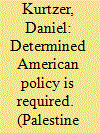

|
|
|
|
|
| Publication |
2014.
|
| Summary/Abstract |
U.S. Secretary of State John Kerry has done an admirable job of creating an "architecture of peace" to support the negotiations launched in July 2013. He engineered the appointment of retired U.S. General John Allen to delve deeply into Israel's security requirements following a peace treaty, recognizing that the security dilemmas would range far beyond the immediate challenges of securing an Israeli-Palestinian border. Kerry understood that Israel's readiness to take the risks associated with withdrawal from the Occupied Palestinian Territories (OPT) would be influenced directly by the degree to which Israel's security requirements were taken into account.
|
|
|
|
|
|
|
|
|
|
|
|
|
|
|
|
| 2 |
ID:
129810
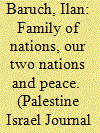

|
|
|
|
|
| Publication |
2014.
|
| Summary/Abstract |
Let me take you for a moment to the negotiations room. There, we see two players silently sitting in front of each other in focused concentration, quietly moving black or white pieces one at a time. The quiet and courteous ambience is deceiving; both are busy contemplating the consequence of defeat.
|
|
|
|
|
|
|
|
|
|
|
|
|
|
|
|
| 3 |
ID:
129796
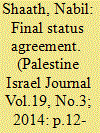

|
|
|
|
|
| Publication |
2014.
|
| Summary/Abstract |
The signing of the Oslo Accords created a tremendous sense of optimism. The Declaration of Principles signed between the Palestine Liberation Organization (PLO) and the Israeli government in 1993 led to many countries establishing diplomatic relations with Israel, a rise in Israel's GNP, and two productive economic conferences in Morocco and Jordan. One of the memories that best symbolizes this period for me occurred in May 1994: I had been invited to Washington by the president of the United States, and on the plane ride there, the whole cabin approached me with their menus asking me to autograph them. People were really excited, telling me: "This is peace! It's good for both parties." I felt their euphoria. It was a win-win game.
You cannot sign a peace treaty in a win-lose game, while devastating the other party. One only needs to look at what happened to the United States in Afghanistan and Iraq as examples. You don't really achieve a long-term solution with devastating wars. The only way you can build real peace is if it's a win-win situation: through negotiations, conversations and dialogues that lead to agreements which equally - or at least satisfactorily - satisfy both people. When it comes to our situation, I think it's not normal to talk now about permanence in these negotiations. Why? Because the interim agreement has continued for over 20 years. It is now 20 years since we signed the Declaration of Principles and the Oslo Agreement in the White House. So we have lived for 20 years in "interimness," and we have become accustomed to it. But "interimness" is not good for the Palestinians: While we've been in this seemingly never-ending interim time period, the Israeli government has been unilaterally changing the parameters, the terms of reference and the reality on the ground, thereby undermining the basis for a permanent solution.
|
|
|
|
|
|
|
|
|
|
|
|
|
|
|
|
| 4 |
ID:
124523
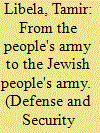

|
|
|
|
|
| Publication |
2013.
|
| Summary/Abstract |
The article discusses processes of “religionization” within the institutional identity and ethos of the Israel Defense Forces (IDF) and the connection of these processes with the significant structural changes the IDF has undergone in recent decades. The main argument presented is that since the late 1980s, the IDF has been in a culture conflict, torn between soldiers and civilians who advocate turning the IDF into a professional army “military professionalization,” and others who wish to preserve, and even strengthen, the “people's army” model. The present article shows that the meaning of the term “people” in this phrase has shifted to refer strictly to the Jewish people, and that a national-ethnic perception strongly influenced by religious-national ideology has been adopted.
|
|
|
|
|
|
|
|
|
|
|
|
|
|
|
|
| 5 |
ID:
132935


|
|
|
|
|
| Publication |
2014.
|
| Summary/Abstract |
This article applies ethnographic methods and historical analysis to explore Jewish-Arab relations within Israeli freemasonry. This article tracks local Masonic history as the fraternity development from individual lodges under colonial like obedience's in late Ottoman and Mandate -era Palestine into a national level organization, under the ground lodge of the state of Israel. In light of an official position of political noninvolvement, Jewish and Arab-Palestine members conveyed shared value of universal fraternity, but variable interpretation of citizenship and nationalism.
|
|
|
|
|
|
|
|
|
|
|
|
|
|
|
|
| 6 |
ID:
131378
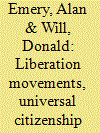

|
|
|
|
|
| Publication |
2014.
|
| Summary/Abstract |
How does a national liberation movement address the security fears of the Other to promote a democratic transition? We consider South Africa and Israel-Palestine apt cases for comparison as the intractability of each conflict derives in large part from a colonial settlement process that led to the creation of ethno-nationalist states. Similarly the manner in which the liberation movements have defined themselves and the Other accounts in part for the successful transition in South Africa and the lack thereof in Israel-Palestine. In the Palestinian case collective intra-movement struggles framing the post-liberation state in exclusive terms have reinforced a predilection by Israelis to fight, leading to an ongoing stalemate and violence; in the South African case framing the post-liberation state in inclusive terms initiated a cycle of movement-Other concessions and democratisation. Our study suggests that universalistic democratic principles codified in public charter will function as a 'master frame' applicable to divided society struggles.
|
|
|
|
|
|
|
|
|
|
|
|
|
|
|
|
| 7 |
ID:
129824
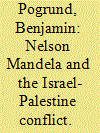

|
|
|
|
|
| Publication |
2014.
|
| Summary/Abstract |
Nelson Mandela's death set off a rush by many in the world to search for lessons in his life, and none have been more eager to do so than Israelis and Palestinians trapped in their conflict. The Importance of Balanced and Compassionate Leadership. The most obvious lesson he offers lies in the critical nature of leadership. After 27 years of imprisonment he emerged into a South Africa torn by violence as the black majority struggled for freedom against a ruling white minority. He quelled the anger among his own people and led them on the path of compromise and reconciliation. His courage and vision earned the respect and support of most whites, which allowed for the rise of a new united South Africa of democracy and non-racism.
|
|
|
|
|
|
|
|
|
|
|
|
|
|
|
|
| 8 |
ID:
129823
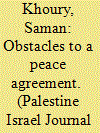

|
|
|
|
|
| Publication |
2014.
|
| Summary/Abstract |
When seriously discussing the fate of the ongoing, everlasting Palestinian-Israeli negotiation, which attempt to reach a peace agreement after decades of conflicts between two people over one historical territory, which I usually refer to as historic Palestine, but which others on the Israeli side may choose to call historic Eretz Israel, analysts are usually face with the dilemma alluded to in the title of this article.
|
|
|
|
|
|
|
|
|
|
|
|
|
|
|
|
| 9 |
ID:
129850
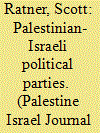

|
|
|
|
|
| Publication |
2014.
|
| Summary/Abstract |
Ever since the deterioration of the Israeli-Palestinian peace process following the outbreak of the second intifada in late 2000, it has been widely acknowledge that relations between the Israeli and Palestinian political establishments have become strained almost to the breaking point. However, far less attention has been directed to the Palestinian-Arab-Israel (PAI) parties whose transformation and pivotal role in the social and political dynamics of the conflicts should not be underestimated.
|
|
|
|
|
|
|
|
|
|
|
|
|
|
|
|
| 10 |
ID:
130411


|
|
|
|
|
| Publication |
2014.
|
| Summary/Abstract |
After Israel's first invasion of Lebanon in 1978, the UN Security Council passed Resolution 425 (UNSCR 425) establishing the United Nations Interim Force in Lebanon (UNIFIL). The early struggle over the contested meanings and interpretations of UNSCR 425, and the differences of position regarding UNIFIL itself were never fully resolved due to the shifting nature of US policies and objectives in the region and the context of the force's deployment within two distinct, albeit related conflicts: the Lebanese civil war and Arab-Israeli conflict. UNIFIL found itself trapped between the competing demands of sovereignty and resistance, not knowing which war it was there to prevent and which peace it was meant to build. This confusion resurfaced with the passage of UNSCR 1701 following the 2006 war, when UNIFIL's mandate and scope was expanded, but the force continued to be a site of contested narratives and potential future conflicts.
|
|
|
|
|
|
|
|
|
|
|
|
|
|
|
|
| 11 |
ID:
131859
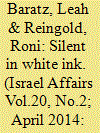

|
|
|
|
|
| Publication |
2014.
|
| Summary/Abstract |
This article seeks to reflect the narrative of discrimination in the writing of Israeli Palestinian women poets through the motif of Silence. This narrative emerges from the analysis and categorization of this motif in some 200 poems, written in Arabic and translated into Hebrew, thus revealing the poets' attitudes to social and political issues. This article shows that the poets' identity is perceived as the marginalized 'other' in Israeli society, not only in terms of nationality and ideology but also in terms of gender.
|
|
|
|
|
|
|
|
|
|
|
|
|
|
|
|
| 12 |
ID:
129797
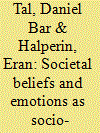

|
|
|
|
|
| Publication |
2014.
|
| Summary/Abstract |
An outsider observing the Israeli-Palestinian conflict might ask him or herself why, after so many attempts and initiatives have been placed on the negotiations table, the adversaries have failed to reach a settlement. Indeed, the "two-state solution" paradigm has been accepted by the majority of people in both societies for over a decade now (Bar-Tal, Halperin, & Oren, 2010), but the parties appear still far from reaching the desired resolution. Moreover, the solutions proposed over the years of negotiations by both officials and non-officials follow a similar paradigm and have in fact established clear contours to a possible peaceful resolution of the conflict. In fact, the Clinton Parameters from 2001, the Arab Peace Initiative from 2002, and Israeli Prime Minister Ehud Olmert's proposal from 2008 all identify the need to partition the land along the 1967 borders, transfer control of the eastern neighborhoods of Jerusalem to the Palestinians, find a fair solution to Jerusalem's holy sites, and formulate a just and agreed-upon solution to the Palestinian refugee problem (Lavie, 2010). Thus, one might ask: If the solution is so clear, what is holding the parties back?
|
|
|
|
|
|
|
|
|
|
|
|
|
|
|
|
| 13 |
ID:
130987
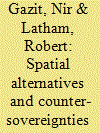

|
|
|
|
|
| Publication |
2014.
|
| Summary/Abstract |
The securitization of the spaces of Israeli-Palestinian interaction, from checkpoints to the West Bank Separation Wall, continues to intensify and receive attention from journalists, scholars, and activists. Understandably, the focus is on the negative consequences of existing spatial configurations. Receiving far less attention is the development of alternative spatial formations which might advance forms of "desecuritization," especially in those spaces that are crucial hinges of Israeli-Palestinian interaction (Jerusalem and other mixed cities, the Wall, the Green Line, roads). This article explores whether alternative ways of using, organizing, experiencing, and coexisting in space-especially at the micro level-hold out promise for helping to reframe significant dimensions of Israeli-Palestinian interaction. It seeks to better understand whether disjointed forms of sovereignty that appear-or disappear-across the occupation can be met by counter-sovereignties; whether new spatial counter-realities can be articulated through everyday life; and whether forms of agency, especially contestation, can reset understandings of, and perspectives on, spaces. A range of examples are considered within Jerusalem, mixed cities, the occupied Palestinian territories and at the border, bearing on religious sites, healthcare, gentrification, security infrastructure, popular protest, and festivals
|
|
|
|
|
|
|
|
|
|
|
|
|
|
|
|
| 14 |
ID:
130409
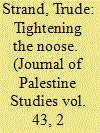

|
|
|
|
|
| Publication |
2014.
|
| Summary/Abstract |
This article outlines and analyzes Israel's Gaza policy during the period from 2005 to 2010. Based on primary materials, including the testimony of Israeli officials before the Turkel Commission investigating the Mavi Marmara incident, classified documents that have come to light through Wikileaks, and Israeli government documentation, the article argues that in the wake of Israel's evacuation of the territory under its 2005 Disengagement Plan, the Gaza Strip became the object of a deliberate and sustained policy of institutionalized impoverishment. Looking at Israeli policy-making as both process and outcome, the article highlights how measures ostensibly implemented to "punish" Hamas-from the incremental tightening of restrictions to the imposition of a full blockade, in addition to periodic military assaults-have pauperized a large proportion of Gaza's more than 1.5 million inhabitants.
|
|
|
|
|
|
|
|
|
|
|
|
|
|
|
|
| 15 |
ID:
131694


|
|
|
|
|
| Publication |
2014.
|
| Summary/Abstract |
'Naming and shaming' those accused of abuse and misconduct is one of the most common strategies of transnational activists. Yet both qualitative and quantitative studies show that the policy and behavioural effects of naming and shaming are often contradictory. Named and shamed actors do respond at least partially by adjusting their policies and behaviour to some extent, but the actions challenged publicly as human rights violations may not cease and can even become more widespread. This ambivalent outcome is usually explained by the uneven capacity of the target to reform or by its 'strategic' response to escape the consequences of naming and shaming. By contrast, I show that naming and shaming can be brought to a standstill when the frame used by transnational activists is ambiguous. I trace the role of framing ambiguity during the Human Rights Watch (HRW) 'naming and shaming' campaigns against the Israel Defence Force (IDF) in the course of the July-August 2006 Israel-Hezbollah war (Lebanon war), and the December 2008-January 2009 Israel-Hamas war (Gaza war). I argue that HRW's use of International Humanitarian Law (IHL) as a frame led to an argumentative deadlock (frame implication contest). This legal frame, and the process of legal framing, did genuinely constrain the IDF, affecting its operations and behaviour. However, the ambiguity of the frame also provided the IDF with a range of material and ideational assets that gave it scope to claim that its actions were actually in conformity with applicable law, and to justify continuing to use force in densely populated areas.
|
|
|
|
|
|
|
|
|
|
|
|
|
|
|
|
| 16 |
ID:
129809
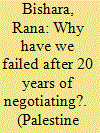

|
|
|
|
|
| Publication |
2014.
|
| Summary/Abstract |
I do not find it right to question the failure of a situation that one expected to fail from the very beginning. So, the question of "why failure?" in this case does not very much apply. We should not be surprised by failure, as certainly at the popular and factional levels. Thought many warned of the high probability of this failure, the Palestine leadership preferred to continue along this track
|
|
|
|
|
|
|
|
|
|
|
|
|
|
|
|
|
|
|
|
|